Thanks to the interest and hard work of Brian Budge, here is the story of the tragic loss of two British destroyers, who ran ashore on South Ronaldsay, Orkney, in a snowstorm in January 1918. There was only one survivor, Able Seaman William Sissons. This page is dedicated to the memory of the 95 casualties of HMS Opal and the 93 of HMS Narborough, and in particular, Frederick James Rotchell RN, the Great Uncle of Mrs. Jane Brady.
A transcript of the Report of Enquiry is provided courtesy of Kieran Brady. Brian Budge has produced the Casualty Lists of Opal and Narborough. [Further reading: Opal and Narborough, January 1918 by Keith McBride, in the The Mariner's Mirror, Volume 85 number 2, 1999.]
Worth looking at is Kieran Brady's website devoted to the sinking.
The people of South Ronaldsay have put up a memorial to those lost:
Local resident William Sinclair (who was 5 when the ships were lost) standing by the memorial in Windwick Bay, with the cliffs at the Clett of Crura where the ships came to grief in the background. Mr. Sinclair passed away in 2000. The memorial itself reads:
In memory of the 188 men who perished here when HMS NARBOROUGH and HMS OPAL were lost on the rocks of Hesta during the snowstorm of 12 Jan. 1918.
The Lord Lieutenant of Orkney, Brigadier Malcolm Dennison, also then a South Ronaldsay resident, laying a wreath at the memorial as part of the dedication ceremony, Sunday, 17th October 1993. On the Thursday before the dedication (75 years after the sinkings), representatives of South Ronaldsay Community Council (including George Esson) travelled aboard the Island class Offshore Patrol Vessel HMS Orkney to lay wreaths at sea at the sites of the loss of HMS Royal Oak in Scapa Flow and of HM Ships Opal and Narborough in Windwick Bay.
The two above photographs are courtesy of (and copyright) Mr. Ken Aymer of Orkney Photographic (OrkneyPhoto@Sol.co.uk).
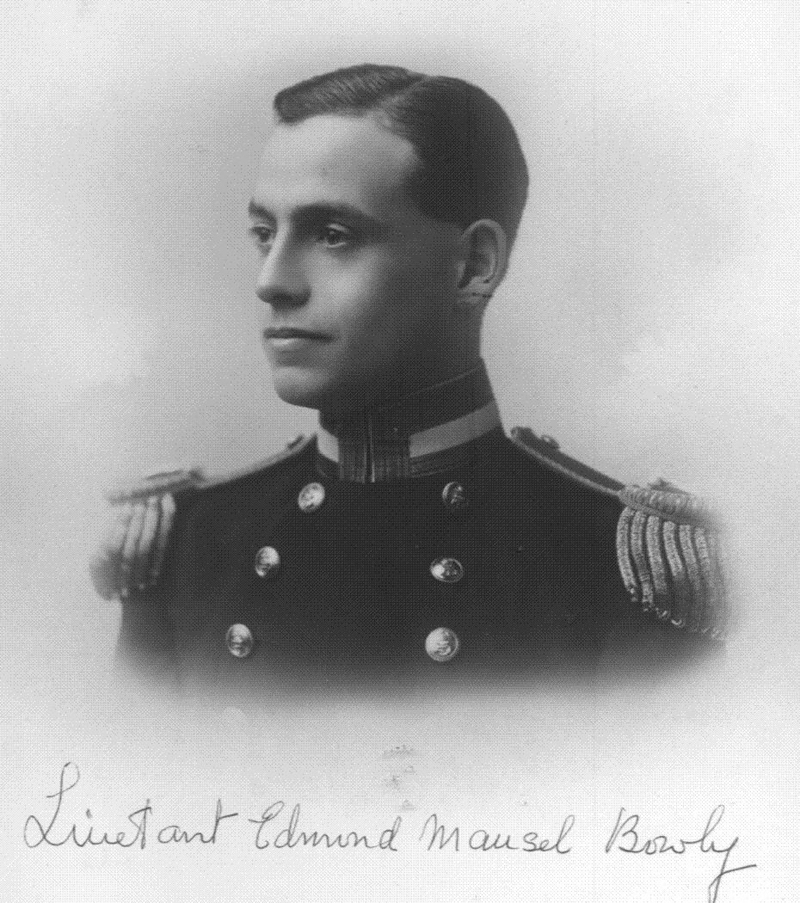
Lieutenant Edmond Bowly, Narborough's Captain
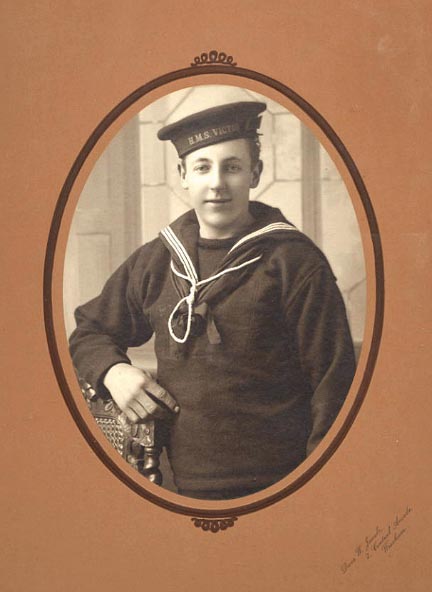
Frederick James Rotchell
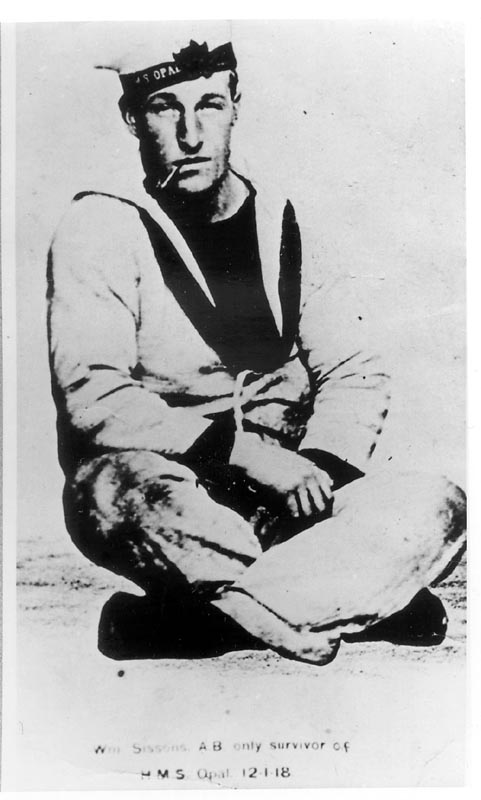
Able Seaman William Sissons, Royal Navy
Jon Saunders/Brian Budge have provided a copy of his service record
It was the generosity of Brian Budge who made it possible to add the following photographs, all courtesy of the Imperial War Museum (IWM photographs may not be copied without the permission of the Imperial War Museum):
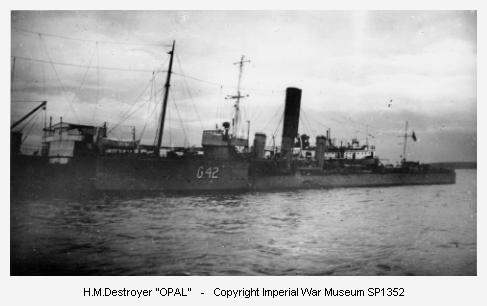
HMS Opal - note pendant number 'G42'
(Imperial War Museum Negative SP1352)
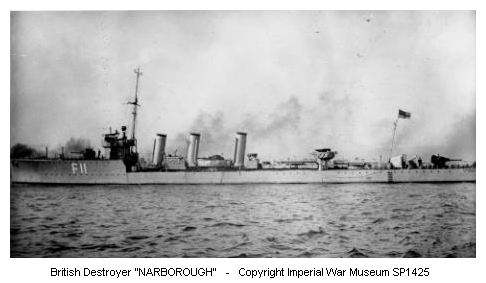
HMS Narborough, wearing pendant 'F11'
(Imperial War Museum Negative SP1425)
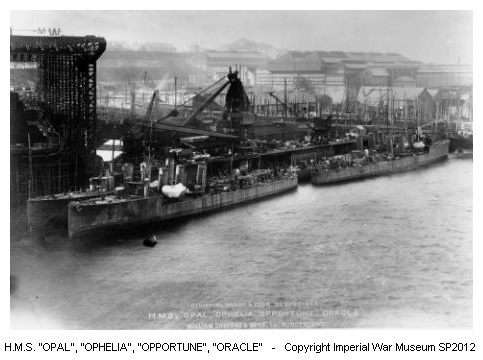
Opal, Ophelia, Opportune, Oracle
(Imperial War Museum Negative SP2012)
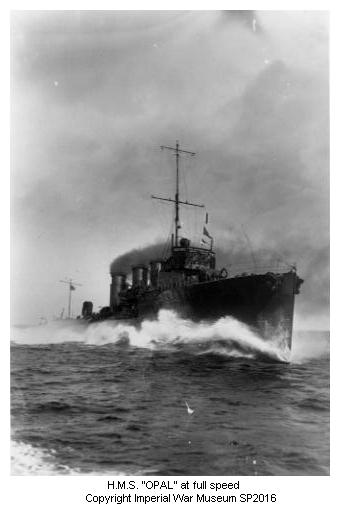
HMS Opal "at speed"
(Imperial War Museum Negative SP2016)
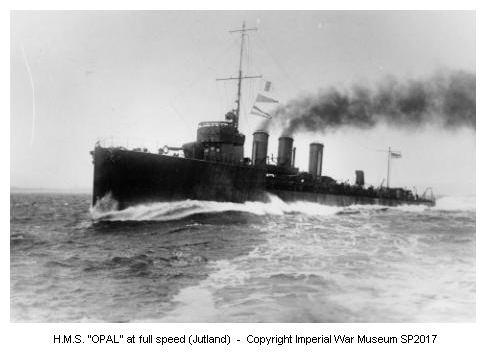
HMS Opal - despite the caption, this photo may not have been taken at Jutland.
(Imperial War Museum Negative SP2017)
| Wreck Number: | 002600791 |
| Latitude: | N 58 46 15.0 |
| Longitude: | W 002 55 48.0 |
| Horizontal Datum: | NG |
| Name: | HMS Opal |
| Type: | British 'M' Class Destroyer |
| Tonnage: | 1,042 |
| Dimensions: | Length: 276 ft
Beam: 27 ft |
| Date Sunk: | 12 01 1918 |
| Chart Symbol: | NDW |
| Charts (Navigational): | 2581,2162 |
| Gen. Depth: | 8 metres |
| Orientation: | N/S |
| Vertical Datum: | LAT |
| Circumstances of Loss: | wrecked in violent gale and snow storm (Narborough in same position) |
| Surveying Details: | see Narborough in same position |
| Wreck Number: | 002600808 |
| Latitude: | N 58 46 15.0 |
| Longitude: | W 002 55 48.0 |
| Horizontal Datum: | NG |
| Name: | HMS Narborough |
| Type: | British 'M' Class Destroyer |
| Tonnage: | 994 |
| Dimensions: | Length: 271 ft
Beam: 27 ft |
| Date Sunk: | 12 01 1918 |
| Chart Symbol: | NDW |
| Charts (Navigational): | 2581,2162 |
| Gen. Depth: | 8 metres |
| Orientation: | N/S |
| Vertical Datum: | LAT |
| Circumstances of Loss: | wrecked in violent gale and snow storm (Opal in same position both sank 12.1.1918) |
| Surveying Details: | PSN 584615N 025548W (Opal in same position) |
| C.P. 27980/23 7.7.23 offer to purchase wrecks turned down | |
| CP 6398/26 22.2.26 further offer to purchase | |
| H1936/26 information extracted from N.L. 4443/18 (X3003/18) wrecks were lying lcose under cliffs heading in a northerly direction about 80 yds from each other. Northern vessel a mass of broken iron work on ledge of rock. Southern vessel less broken and in deeper water no mast or funnels showing and both almost entirely submerged at HW. POSN 584615N 025548W | |
| CP 8844/26 further offer to purchase refused | |
| CP12612/32 24.6.32 further proposal to salvage by Mr. Sutherland | |
| CP 16380/32 wrecks sold to Mr. Sutherland | |
| CP 26977/36 21.9.36 wrecks now ownded by Messrs Southerland and Mawat | |
| H1310/86/20 7.8.86 northerly area of wk site dived. Much scattered wkge and 3 inch shell cases, well battered and eroded by tidal action, litter the seabed. No danger to navigation. Gen. depth 11 mtrs - rocky bottom sloping seawards (B. Winfield 26.7.86). |
In November 2000, I began to research the naval service history of my wife's Great Uncle - Frederick James Rotchell. I found Fred's entry at the Commonwealth War Graves Commission site and a general search of the Internet turned up a few 'hits' about HMS Opal (his ship) & HMS Narborough being lost in a collision off South Ronaldsay, but with very little detail. Up to then, the family thought that Fred's ship had been torpedoed, so the collision theory really grabbed my attention.
I posted a request for help on an Internet bulletin board (Naval Help Requests) which is now ceased, but learned from a contact there (Dave Hepper) of an entry in the Mariner's Mirror vol 85, 1999. I ordered a back copy and discovered K.D. McBride's article, which was a précis of the Admiralty Records held at the Public Record Office in London. The article stated that all hands bar one (Wm Sissons) were lost in the accident, during a terrible snow storm.
I was now really fascinated by the events and determined to try and discover as much information as possible. My brother and his son promised to visit the P.R.O. for me and see if they could get their hands on the original Admiralty documents - which they did in due course and the result of their hard work is reproduced here. In the meantime I scoured the Internet and poured over maps to try and pinpoint the actual wreck site, but with little success. It was now March 2001 and in desperation I faxed the Northern Constabulary Orkney Command Area in Kirkwall asking for assistance in tracking down the owner of the wreck. As it turned out, this was to lead to an amazing discovery.
A couple of days after sending the fax I had a call from Chief Inspector Mike Cowdry, who said that I should contact a Willy Budge or George Esson on South Ronaldsay and that they could provide me with some very interesting information. He warned me that Willy Budge was very shocked to hear the name Frederick Rotchell, but couldn't tell me any more.
I telephoned George Esson, who is writing a book about the wrecks of Scapa and he wanted to include a chapter about HMS Opal & Narborough. George kindly sent me all his information about the disaster, including a photograph of William Sissons the sole survivor.
Later that day, I telephoned Willy Budge. He was only aware of two names from the disaster - one obviously, was William Sissons (the sole survivor). Amazingly the other name was that of an F.Rotchell mentioned in a story told to him by John George Halcro (now deceased). Willy relates the story,..
John George Halcro was clambering over the cliffs on one occasion and came across the nest of a cormorant. They scavenge bits of metal - lead and cordite from the wreck, to line their nests with. But in this particular nest was something glinting - it was a piece of brass. On closer inspection, it turned out to be the brass name plaque from a ship's ditty box - bearing the name F.Rotchell !!
No wonder Willy's hair stood up on the back of his neck when he heard the name of the person I was researching. He also relates that there was a torpedo explosion a few weeks after the disaster that blew the main gun from HMS Opal into the hillside above the cliffs. The gun is now in Lyness Museum after being rescued and restored by Willy (it was being used by a neighbour as a drain!) along with a lifebelt that was donated by George Esson.
In April 2001 I received video footage of the wreck site from Willy, including a package that contained the brass name plaque from the cormorant's nest which had been re-discovered by a Mrs Scott, who had cared for J.G. Halcro before he died.
So there you have it - thanks to the powers of the Internet, the efforts of my brother and nephew, the boundless enthusiasm and kindness of the people of the Orkney Islands (and the very good taste of a house-proud cormorant); my wife and family now have a very vivid and lasting memorial to Great Uncle Fred.
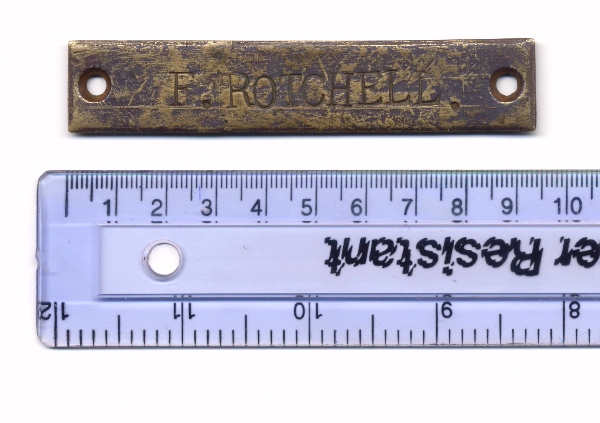
Brian Budge adds the following notes regarding the graves of the crew of the two destroyers in the Lyness Cemetery:
I've made a detailed row-by-row search of all the World War I sections. Eight of the graves of HMS Opal casualties and six of HMS Narborough are grouped together in Section B, which is located in the NE corner of the cemetery (with HMS Vanguard graves in line to the south). Two graves, of Telegraphist FARQUHAR of HMS Opal and A.B. ORANGE of HMS Narborough, are in Section D, while another two, of Stoker HARPER of HMS Opal and A.B. TOMS of HMS Narborough, are in the separate Roman Catholic Section O in the SE corner. I have found NO OTHER NAMED grave of a casualty from either destroyer, so the listing in the Commonwealth War Graves Commission Register for Lyness Cemetery of 10 HMS Opal and 8 HMS Narborough casualties is full and correct. I DID find 35 graves of "A Sailor of HMS 'Narborough' (or 'Narbrough'), Known unto God" and 1 only of "A Sailor of The Great War, Royal Navy, 12th January 1918". I was surprised NOT to find even one grave of "A Sailor of HMS 'Opal', Known unto God" and have given some thought to this. It is possible that A.B. William Sissons (the only survivor of the tragedy) was able to identify all the bodies of HMS Opal crew found, or that it was assumed that he had done so and the other bodies found were marked as crew of HMS Narborough.
![[Graves]](opnargs.jpg)
Section 'B' of the cemetery at Lyness, where most of the Opal and
Narborough graves are located -- courtesy of Brian Budge.
(click for an enlargement)
![[Opal's Gun]](images/opalgun.jpg)
Opal's gun, restored by Willy Budge and donated to the Lyness Museum
(photograph by Brian Budge)
![[Kisbee Ring]](images/opalbelt.jpg)
Lifebelt ("Kisbee ring") from HMS Opal, donated to the Museum by Mr. George Esson, of St Margaret's Hope
(photograph by Brian Budge)
Return to WWI The Maritime War
Return to WWI Archive main page.